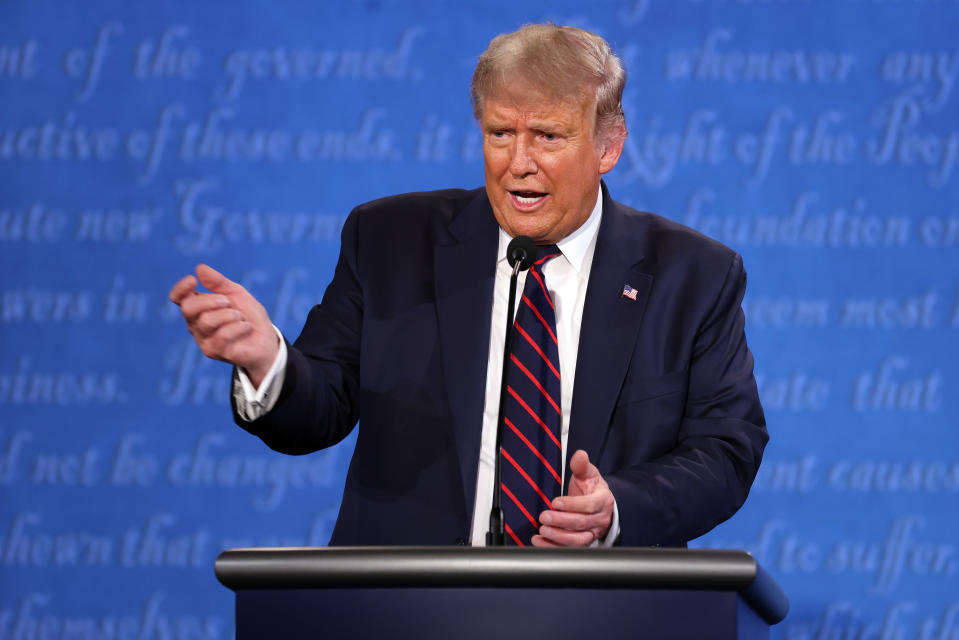Drug endorsed by Trump no more effective than placebo at warding off coronavirus, study suggests

A new study suggests a drug taken by Donald Trump to ward off the coronavirus is no more effective than a placebo.
The president announced in May he had been taking the anti-malarial medication hydroxychloroquine for a week and a half, causing first-time prescription rates and online searches for the therapy to soar.
Hydroxychloroquine is not approved for the prevention or treatment of COVID-19, the disease caused by the coronavirus, in the UK or US.
Evidence suggests the drug is ineffective in advanced COVID cases, however, the jury is out on whether it has benefits during the initial stages of ill health. It was also unclear whether hydroxychloroquine could prevent the infection taking hold in the first place.
Read more: UK coronavirus cases exceeding April's 'peak' – why are deaths low?
To learn more, scientists from the University of Pennsylvania looked at 125 healthcare workers who looked after coronavirus patients.
Results revealed no significant difference in infection rates between the staff taking a daily dose of hydroxychloroquine or a placebo pill over eight weeks.

Safety concerns for hydroxychloroquine were flagged early in the outbreak.
Harvard scientists found that out of more than 96,000 coronavirus patients, those given hydroxychloroquine were a third (33%) more likely to die than those receiving other forms of care.
This rose to a 44% higher risk when hydroxychloroquine was combined with an antibiotic from the class macrolides.
Those on hydroxychloroquine with a macrolide were also over five times more likely to develop a de-novo ventricular arrhythmia – the sudden onset of abnormal beating in the lower chambers of the heart – than those in the control group.
Read more: Vitamin D linked to reduced risk of coronavirus death
The research was said to have a “profound impact” on the World Health Organization’s decision to stop testing the drug, a move one expert called “completely unjustified”, with clinical trials “providing definitive and actionable answers”.
A team of European scientists later found hydroxychloroquine was not associated with deadly heart rhythms among patients with a low risk for the complication.
While safety issues may be up in the air, the Pennsylvania team set out to uncover how effective the therapy is at warding off the coronavirus among those at a high risk of infection.
Watch: How is coronavirus treated?
The scientists recruited a range of healthcare workers across two urban hospitals, from doctors and nurses to emergency technicians and respiratory therapists.
Of the 132 recruited workers, 125 initially showed no coronavirus symptoms and tested negative for the infection.
These 125 were then given either 600mg of hydroxychloroquine or a placebo tablet every day for eight weeks.
Of the 64 workers given the drug, four went on to test positive for the coronavirus. This is compared to four positive cases among the 61 participants on the placebo – not a statistically significant difference.
Mild side effects affected nearly half (45%) of those on hydroxychloroquine, compared to just over a quarter (26%) taking the placebo, however, rates of treatment discontinuation were similar between both groups.
Read more: Pets 'helped people cope emotionally' during lockdown
The scientists then looked for changes to the participants’ QT – a measurement of the heart's electrical activity.
Hydroxychloroquine can cause a dangerous electrical change in the heart of some patients. This is called QT prolongation due to the pattern it makes on an electrocardiogram.
The results – published in the journal JAMA Internal Medicine – revealed no significant difference in QT changes between those on hydroxychloroquine or placebo.
While this may sound reassuring, the scientists stressed the coronavirus may cause inflammation of the heart muscle, with hydroxychloroquine potentially then triggering a cardiac event.
All the participants who tested positive for the coronavirus recovered, with none requiring hospital care.
The scientists concluded: “There was no clinical benefit of hydroxychloroquine administered daily for eight weeks as pre-exposure prophylaxis in hospital-based healthcare workers exposed to patients with COVID-19.”
Dr Anthony Fauci – director of the US National Institute of Allergy and Infectious Diseases – told the BBC in July “every single good study has shown hydroxychloroquine is not effective in the treatment of COVID-19”.
The US Food and Drug Administration “cautions against use of hydroxychloroquine for COVID-19 outside of the hospital setting or a clinical trial due to risk of heart rhythm problems”.
The US Centers for Disease Control and Prevention has also said “current data indicate the potential benefits of these drugs do not outweigh their risks”.
Other experts have previously called for further research.
“This is a drug that is very widely used for a disease that kills hundreds of thousands of people, but on the basis of no good evidence,” said Professor Martin Landray from the University of Oxford.
“The sooner we get answers from randomised controlled trials the better.
“If it turns out hydroxychloroquine is effective for COVID-19, then let’s use it; if not, let’s abandon it. But this is not a time for speculation.”
Watch: UK coronavirus cases high but deaths low - why?

 Yahoo Lifestyle
Yahoo Lifestyle 
